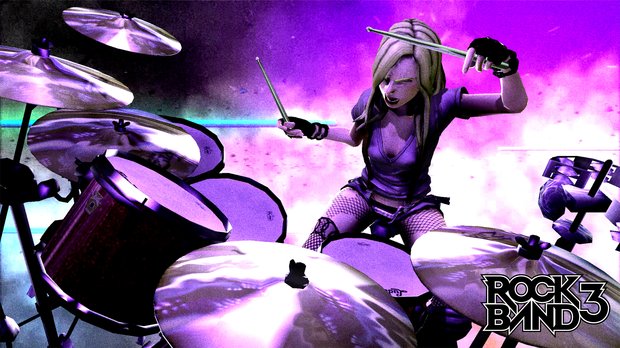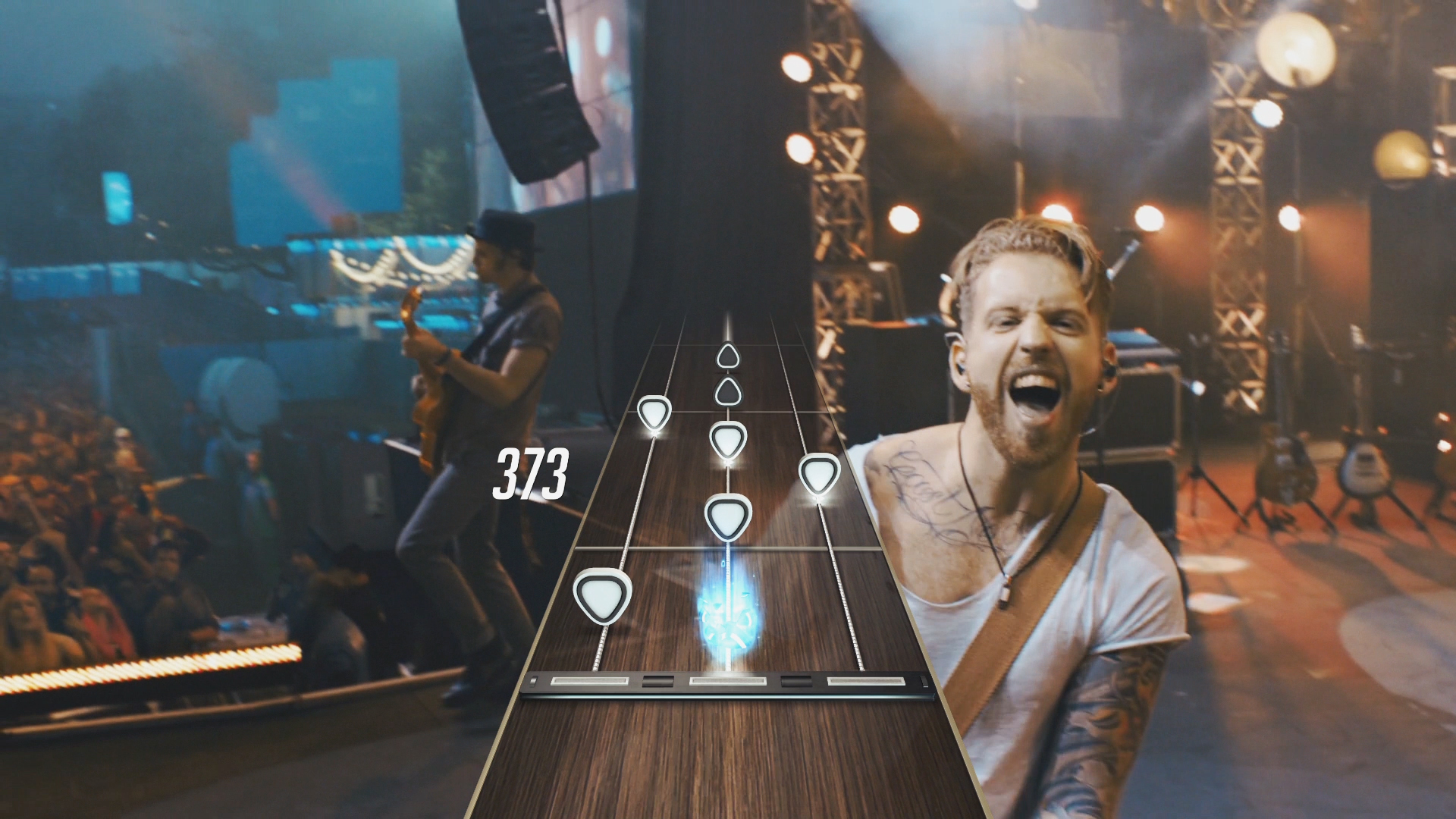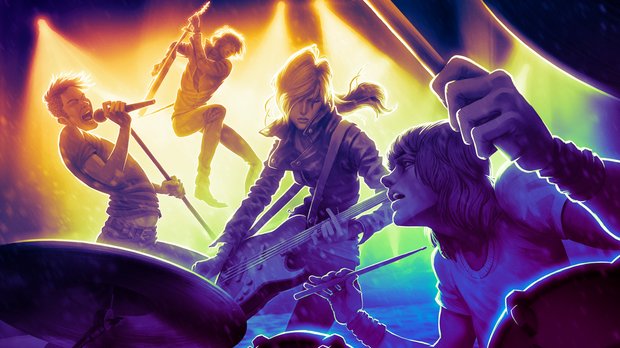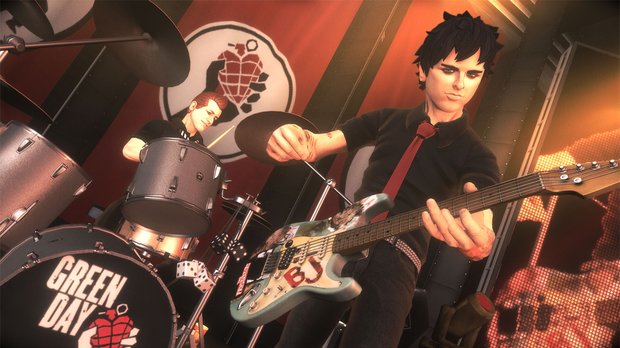This new wave of rhythm games needs to remember the hardcore fans
Rock Band 4 and Guitar Hero Live are hoping to recapture the boom of last-gen's plastic instrument peripherals on the latest consoles. Though it's still early days, it seems like both games are aiming to play up the fantasy of being a real rock star: Rock Band has more room for self-expression, while Guitar Hero drops you into a Being John Malkovich-style first-person FMV of someone who's shredding onstage. These new design choices seem like they'd make the games more accessible to beginner-level onlookers than ever, but they've got me worried. In my mind, the era of casual, party-friendly rhythm games has come and gone. Now it's time for Western rhythm games to cater to the hardcore fanbase. In other words, they need to learn from their Japanese counterparts if they want to succeed.

I've probably played 200-plus hours of Rock Band by myself. That might sound ludicrous, given how most people think of Rock Band and Guitar Hero as party games, primarily meant to be played in large, possibly drunken groups. And while I can appreciate the camaraderie of jamming out as part of a full band (I do have friends to join up with, I swear), I don't play rhythm games to simulate the experience of performing a set in front of a sold-out crowd. I play them because they're tests of skill in their own right, without needing to perfectly replicate the artistry of being a real musician. And with no disrespect to any party-going performers, I think it's the hardcore players like me who could determine if this new era of Western rhythm games nails the comeback or slumps back into obscurity.
There's a simple explanation for why the mainstream-focused approach might stumble: consumer confusion. Raise your hand if you own a full set of plastic instruments that you haven't used in ages. Now, of those people, who would be interested in buying an entirely new set that's compatible with their latest console? If you just dropped your hand like a stone, don't worry - Harmonix has plans to let your old controllers work on the new systems, and Activision would be foolish not to follow suit. But that repeats the same mistake that made the Wii U such a hard sell, where hardware overlap that's meant to be a convenience simply confounds anyone who isn't a dedicated gamer. There are enough perplexing (and still unanswered) questions - mainly controller compatibility and DLC transfers across platforms - to make a casual fan just give up on the idea of buying these reboots altogether, content to let their rhythm gaming experience stay in the past.

But hardcore players will take the time to sift through all that complexity, because they're ready to buy these games no matter what. They'll happily pick up the latest in their preferred series to see what's changed. They'll justify unearthing all those dusty peripherals or buying a new, still-totally-fake instrument (probably the best possible peripheral available for their favorite role). I think I've gone through three drum sets in my four-game Rock Band tenure, and I sprung for all the extras without thinking twice.
A custom metal plate to prevent the foot pedal from cracking in half (before Harmonix started building those in). Felt pads to ensure that my percussion was precisely detected. The Pro Drum cymbals kit, once Rock Band 3 introduced this new wrinkle to expert-level drumming. And those upgrades are practically mid-level: I've stared in envious awe at dozens of tricked-out setups used by YouTube's Rock Band drumming elite, which could very well cost hundreds of dollars and hours of troubleshooting to set up in the first place. But it's all worth it, just to create the ultimate game experience.
Hardcore players are keenly aware that these are high-scoring games, not applicable training or fantasy fulfillment. Japanese rhythm mainstays like Beatmania or Dance Dance Revolution don't try to simulate the skills of a real DJ or trained dancers. They've established their niche, and they know what their players want: new songs to push the boundaries of hand/body coordination even further, with positively cosmic skill ceilings and scrolling note patterns that look like they could induce seizures and arthritis all at once. Constant escalation has kept those series alive for almost two decades, with dozens of sequels that are essentially the same base game, only harder.
The devoted fans who keep coming back - including Rock Band players like yours truly - are essentially the 'whales' of rhythm gaming. Like the small percentage of dedicated gamblers and Facebook gamers who spend a disproportionately large amount of money compared to the rest of the playerbase, the hardcore will continue to support a series as long as it continues to challenge them. I've spent more money than I care to admit on DLC songs, most with the hope that they would nudge my skills just a little bit further. Cost was not a factor, so long as my play experience was being enhanced ever so slightly.
Sign up to the GamesRadar+ Newsletter
Weekly digests, tales from the communities you love, and more

You'd think, then, that support from these diehards would be a given, allowing Rock Band 4 and Guitar Hero Live the freedom to focus their creative efforts elsewhere. But chasing after mainstream popularity is a gamble, and while the market for hardcore fans is smaller, it's a much more sustainable, dependable source of revenue. Casual players are content to play Rock Band at a party for a night, but it's doubtful if they'll actually buy it for themselves. Hardcore players will buy the latest and greatest instruments, and continue to pump money into the DLC machine for as long as their wallets.
There are limits, though. When a sequel starts to feel like it's pandering to a wider audience for the sake of profits, the devotees are more than ready to bounce. Guitar Hero: Aerosmith does not appeal to players like me. Neither does Green Day: Rock Band, or Taylor Swift and No Doubt being playable in Band Hero. Moves like these are what put Western music games on ice in the first place: spin-offs that couldn't justify their full-price existence to the mainstream or hardcore audiences.

Packaged experiences tailored to a band's identity don't mean much to hardcore players, because popular music isn't as valuable to them as new, challenging note charts to conquer. Aerosmith's 'Walk This Way' is undoubtedly a good song, but it can't possibly offer the kind of hand-cramping challenge as something like Dragonforce's 'Fury of the Storm' and its frenzied shredding. Freezepop's 'Science Genius Girl' will never be as well-known as Green Day's 'Boulevard of Broken Dreams', but it's so much more invigorating to play, given how it doesn't feel like something I could do in my sleep. Compare those playthroughs after the first minute, and you'll see what I mean.
As I soak up info on the new Rock Band and Guitar Hero games, I'm concerned that Harmonix and Activision might be trying go in a direction that dismisses the wants and needs of their most loyal players. Instead of giving the hardcore fans new, interesting ways to test themselves, Rock Band 4 and Guitar Hero Live seem like they're trying to elevate rhythm gaming to be the digital version of Rock 'n' Roll Fantasy Camp, with challenge being more of an afterthought. The optimist in me wants to give these new approaches the benefit of the doubt, but my inner hardcore player is wishing that we could just ditch these redesigns and focus on what really matters. Not pretending to be a rock star, but actually playing a game.
Lucas Sullivan is the former US Managing Editor of GamesRadar+. Lucas spent seven years working for GR, starting as an Associate Editor in 2012 before climbing the ranks. He left us in 2019 to pursue a career path on the other side of the fence, joining 2K Games as a Global Content Manager. Lucas doesn't get to write about games like Borderlands and Mafia anymore, but he does get to help make and market them.



